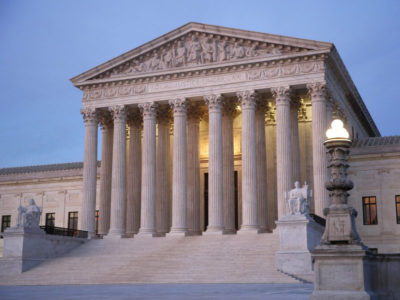In a 6-3 decision, the United States Supreme Court (SCOTUS) offered a ruling Monday morning that represents a major victory for advocates of gay rights. It ruled that existing federal law forbids job discrimination on the basis of sexual orientation. This is a surprising ruling from an increasingly conservative court.
The decision said Title VII of the Civil Rights Act of 1964, making it illegal for employers to discriminate because of a person’s sex, among other factors, by definition also covers sexual orientation. The surprising majority decision was written by Justice Neil Gorsuch of Colorado, President Donald Trump’s first Supreme Court appointee. He was joined by Chief Justice John Roberts and the court’s four, more liberal members to form a majority.
“An employer who fired an individual for being homosexual or transgender fires that person for traits or actions it would not have questioned in members of a different sex,” Gorsuch wrote for the court. “Sex plays a necessary and undisguisable role in the decision, exactly what Title VII forbids.”
He added, “Those who adopted the Civil Rights Act might not have anticipated their work would lead to this particular result. But the limits of the drafters’ imagination supply no reason to ignore the law’s demands.”
Gorsuch added, “Only the written word is the law, and all persons are entitled to its benefit.”
There are 21 states across the U.S. that have their own laws prohibiting job discrimination based on sexual orientation or gender identity. Another seven states provide protection to public employees, but not to all workers across those states.
Monday’s ruling means federal law now provides similar protection for LGBTQ employees across the rest of the country. Gay rights advocates across the country and in Colorado are celebrating the ruling.
“Today we celebrate a victory for Lesbian Gay Bisexual Transgender and Questioning (LGBTQ) equality that is meant to end discrimination for employees. Until the ruling by SCOTUS this morning, it was legal in 27 states, over half of the “United” States, to fire an employee, evict a person from their home, and to deny them a home loan (among many things) based on sexuality and/or gender),” said local LGBTQ rights activist Jimmy Sellars. “As great a milestone as this is, there is still so much work that has to be done. On a daily basis, the LGBTQ community faces discrimination that not only includes their gender identity and sexuality, but their race, differing abilities, and chosen religious beliefs. We’ve been fighting so hard since 1992. In a way, Focus on the Family planned their assault on the wrong city….they really constructed the LGBTQ rights movement in Colorado.”
Sellars shared his personal story.
“In 1992 I was ‘let go’ from Guiry’s, an art and paint store in Denver, because my manager didn’t like that I was homosexual. After working there for nearly a year she found out that I was gay. She removed me from the schedule within a couple of days and told me that they no longer needed me – interviewing my possible replacements in front of me. At an employee function a few days later, with a few drinks in her, she told the staff how she got rid of me and how “we can’t have people like that around us, we’re a strong family business!” As a 24-year-old, I didn’t know how to battle the discrimination, as most people don’t. I needed a job to support myself and so I did what anyone has to do and I started looking for another job. Countless people lose their jobs this way, have difficulties renting or getting a mortgage, and are denied services based on their gender identity and/or sexuality.
Sellars points out that “Rural Colorado is devoid of LGBTQ people – we make up a healthy part of the fabric of rural America. As Chaffee County becomes more diverse it is important to know that the same challenges of rural life that we all face are amplified while adding the community impacts of rejection and acceptance on LGBTQ people.”
Gay and transgender rights groups consider this case a highly significant one, some say even more important than the fight to get the right to marry, because nearly every LGBTQ adult has a job — or needs a job.
“Today’s ruling, like SCOTUS’ ruling on marriage, gives people everywhere the confidence to go to work without the fear of being fired based on who they love and their gender,” adds Sellars. “I have to add though, this ruling is bittersweet. Included in the Civil Rights Act are protections for all people, and unless your head is shoved under your seat cushions, we are seeing that these laws need to be upheld and that people need to be held accountable in order for them to work.”
Until this decision, in many states, while it might be legal to marry one day, you could still be fired from your job the next day for being gay or lesbian. The court’s decision conceded that sexual orientation was not on the minds of anyone in Congress when the civil rights law was passed. But they went on to say when an employer fires a male employee for dating men, but not a female employee who dates men, that violates the law.









Recent Comments